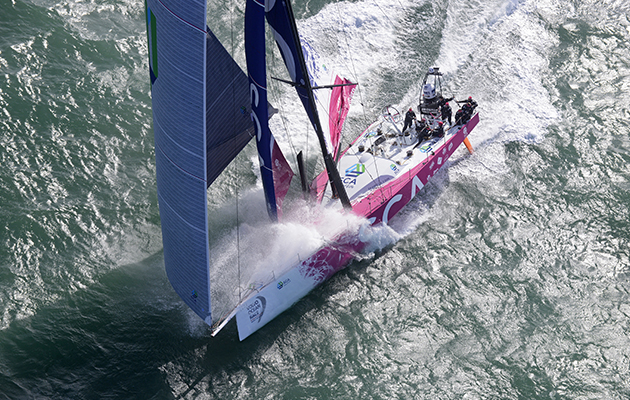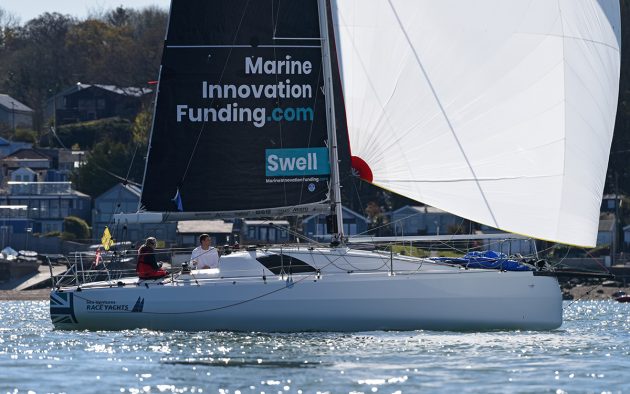Olympic sailing is in turmoil, with the classes to be sailed in the 2024 Games still undecided. Shirley Robertson tells Helen Fretter why the proposed mixed gender double-handed offshore class would be so positive for sailing.
With just three years until the 2024 Olympics take place in Paris, the Olympic sailing classes for the 2024 Games are yet to be confirmed.
This week the International Olympic Committee (IOC) gave World Sailing, the sport’s governing body (formerly ISAF), six weeks to come up with a new plan for the Paris Games in 2024, as well as for the 2028 Olympics. All this while the Tokyo 2021 Games is just 93 days away.
The current programme is for 10 Olympic sailing medals. They will be raced in three male and three female classes (the Laser and Laser Radial, 49er and 49er FX, and men’s and women’s foiling windsurfing) and four mixed, including Nacra 17, 470 and kiteboarding.
A proposal was made in 2018 that the mixed fleets should include a double-handed offshore class.

Doublehanded racing is a key growth area for sailing
The proposal was radical – it would create the longest racecourse in the Olympics, with round-the-clock competition over a short coastal track (the race was expected to be around three days long). The yacht class to be used would also need to be determined.
But double-handed racing is one of sailing’s biggest growth areas. Many of the world’s biggest inshore and offshore events have introduced double-handed fleets to meet ever-increasing demand, a trend accelerated over 2020 by double-handed racing’s neat fit with social distancing and ‘bubbles’.
The announcement that double-handed offshore racing was under consideration for the Olympics also attracted new sailors and returning sailors into the Olympic sailing fold.
One of those was Shirley Robertson, one of the most successful female Olympic sailors of all time, as well as being a highly experienced broadcaster and commentator, covering major sailing events for the BBC and CNN.

Shirley Robertson racing alongside Henry Bomby in a Sunfast 3300. Photo: Rick Tomlinson
Robertson, who won gold in Sydney in 2000 and Athens in 2004, has been racing a Sunfast 3300 with Henry Bomby. She has also been racing two-up with Jeremy Waitt on the JPK 10.10 Jangada, the RORC Yacht of the Year.
Article continues below…
Paralympic sailing to be dropped for Tokyo 2020 Games
According to IPC President Sir Philip Craven, sailing, ‘did not fulfil the IPC Handbook’s minimum criteria for worldwide reach.” The…
Shirley Robertson on Ynglings
Sue Pelling interviewed Olympic gold medallist Shirley Robertson to ask about her immediate sailing plans and her views on the…
Robertson believes that a double-handed offshore fleet in the Olympics could bring wide-ranging benefits to the sport of sailing.
The most obvious gain is that introducing the new class to the 2024 Games, hosted in France, would generate huge spectator engagement.
“The Vendée Globe, the Route du Rhum – I’ve been to many French offshore race starts, and they are without a doubt the most supported sports events I have ever been to,” Robertson explains.
“It’s no coincidence that the offshore discipline was proposed for the Paris Games, the sport is massive in France, and the interest it would create within the public and the media would be huge. So as far as Paris 2024 goes, it’s a complete no brainer – it would be amazing.

Huge crowds usually assemble in France for the start of the Vendée Globe
“Moving forward, I can’t think of a recent Games where an offshore coastal race would not have been an exciting addition, and looking at 2028, I’m sure the same could be achieved in LA.
“But more than that, double-handed offshore at the Olympics would represent a vast sector of the sport of sailing, and would pique the curiosity of a significant sector of participant that has no interest in dinghy racing.
“Most importantly, to me, it would create a different pathway into long-term inclusion and commitment in the sport.
“I’m very keen to hear any opinion explaining why it’s inclusion would be detrimental to the holistic health of sailing, but I’m afraid, so far, no one has stepped forward with a viable argument.”
Made for TV
Concerns raised by the IOC include how organisers could secure the competition field (a coastal racecourse), the challenges of broadcasting the event globally, and the fact that World Sailing has not yet delivered an Offshore World Championships (the scheduled 2020 event being cancelled due to Covid-19).
Robertson, who has huge experience in the logistics of broadcasting sailing events, believes the cost and challenges have been exaggerated.
“To be honest, taking into account the resources that OBS (the Olympic broadcaster) had in Rio to cover a medal racecourse, I find this pretty hard to accept. The early rounds of the [America’s] Cup in Auckland were covered with one chase boat and one helicopter. Sail GP have to date used one helicopter, and one chase boat.

Significant. resources went into coverage of a single medal race course in the 2016 Olympic Games in Rio
“The very skilful camera operators involved in this are the same guys that film at the Games, where, in Rio, there was more than double the resource. All of those assets are already in place for the Olympic regatta, so I’m baffled why it’s been suggested the broadcast would cost millions more Euros.
“I appreciate the technology of supplying onboard coverage is complex, but many of the Olympic classes run onboard [cameras], bikes in the Tour de France run onboard cameras.
“To my mind the multi-day offshore event should be a mouth-watering prospect for the broadcast offering from the Games, a one of a kind showcasing sailing with imaginative coverage. And tracking – what a massive interactive opportunity! The Sydney Hobart race, the Middle Sea Race, the Fastnet Race, they’re all covered with a fraction of the [Olympic broadcast] budget.”
Securing the competition area should also not be insurmountable, as Robertson points out “The reality is the course is largely coastal, it’s not full on ocean sailing.”
Losing an Olympic sailing medal?
For many involved with Olympic sailing, the risk is that if the IOC deem the mixed keelboat unsuitable for Paris 2024, then sailing might be demoted to nine medals.
Among the many alternative ideas being bounced around are: splitting one of the mixed fleets to create men’s and women’s medal classes; reinstating the Finn, the heavyweight singlehanded dinghy which will lose its Olympic class status after the 2021 Games; or reintroducing match racing, or even team racing, to the Games.
Whatever solution is chosen, it will need to meet the IOC targets of gender parity for 2024 as well as reducing overall athlete numbers.
“To be scrambling around with a six-week timeframe ‘looking’ for another medal option that ‘fits’ the IOC criteria, when in reality we are already a year into the Paris cycle, is utterly unacceptable,” says Robertson.
“This offshore option was discussed at a high level within the governance framework of our sport, and by a significant margin was voted in. For some time now, rumours of its apparent ‘unsuitability’ have been rife, grumblings from the IOC have been around for some time.
“So where is the contingency? Where is the option, readied and prepared for the inevitable refusal of the IOC to ratify the offshore event? It doesn’t exist.
Robertson believes that “if they could, the leadership of our sport would solve this problem in one easy vote: bring back the much loved Finn class, give Olympic opportunity back to the heavier male sailor, attract the biggest names back into the sport and be done with it.
“It won’t happen of course, the optics are far too bad.

The Finn is the class due to be replaced in 2024, could it make a comeback after the latest IOC and World Sailing wranglings?
“So they’ve delayed and delayed, but the fairest thing is to split the combined kite medal. At least there’s a fleet of women’s kitesurfers that have actually been training for an Olympic event, so it’ll impact them the least, and have the benefit of gender parity.”
Women’s sailing opportunities
For Robertson, one key advantage of the mixed double-handed Olympic sailing medal is that it creates a career pathway for experienced women sailors that is currently sorely lacking.
“I’ve just returned from Auckland, where for four months I’d been commentating for the America’s Cup. I’ve been commentating on four teams chasing the illusive trophy, the pinnacle of our sport, in a regatta comprised of teams made up solely of male sailors, male coaches, male decision makers.
“I am not looking for issues through which to generate a gender discussion, but this example has some very significant implications.
“Offshore coastal racing is surprisingly accessible – boats around 30ft are available in many of the world’s marinas. It’s a relatable discipline, and presents a real pathway into competitive sailing, but also into a form of competitive sailing that isn’t dinghy sailing.
“It is not an exaggeration to say that, despite claims to the contrary, there is currently no realistic, achievable pathway into any kind of decision making role in sailing for female athletes after an Olympic campaign, and this option would help change that.

The all female team SCA took part in the 2014-15 Volvo Ocean Race and were allowed a greater number of crew than other mixed teams and all-male teams
“In the current, barren landscape for women in sailing, the introduction of the mixed offshore discipline presented a way to make a real dent in to the status quo. Double-handed offshore had the capacity to provide a genuine pathway, to create respected, skilled female athletes.
“Previous efforts to half-heartedly manufacture rules or incentives to have women on boats, thinly veiled attempts at presenting a publicly acceptable gender equality, is not helping women achieve in our sport.
“Creating a mixed double-handed pathway, would, following a Games cycle, produce a pool of really talented women decision makers with an irrefutable set of assets [who are] as valuable onboard as their male counterparts.
“This would be an unprecedented step forward. It would be a stride towards the levelling of a playing field that is so very far from being equal across all aspects of our sport.”
What do you think? Should double-handed offshore racing have a place in Olympic sailing, or should the 10th medal go to another class? Email yachtingworld@futurenet.com
Shirley Robertson hosts a regular podcast with some of the biggest names in sailing. See http://shirleyrobertson.com/podcast/
 If you enjoyed this….
If you enjoyed this….
Yachting World is the world’s leading magazine for bluewater cruisers and offshore sailors. Every month we have inspirational adventures and practical features to help you realise your sailing dreams.Build your knowledge with a subscription delivered to your door. See our latest offers and save at least 30% off the cover price.






